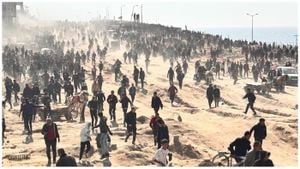On November 18, 2024, the city of Ramat Gan, located near Tel Aviv, was shaken by the impact of falling shrapnel, resulting from missile defense efforts against rockets fired from Lebanon. This alarming incident left at least five individuals injured, highlighting the continuous tension between Israel and its northern neighbor, Hezbollah. Magen David Adom, Israel's ambulance service, confirmed the severity of injuries suffered by those affected.
Eyewitness accounts painted a vivid picture of the chaos; one resident described the moment, saying, "There was a huge boom, I felt the blast wave, and the house shook.” Those who encountered the explosion were left reeling from the experience as emergency personnel swiftly responded to the scene.
Eran Lansky, who was severely wounded during the attack, recounted his terrifying ordeal. Lansky, who operates a suit shop nearby, shared, "I had just finished helping a family five minutes earlier. They left the shop, and then the siren started. I was about to leave, and then I heard two explosions. On the third explosion, it felt like everything flew at my face. I was thrown about ten meters. Everything went black." After the explosion, Lansky was rushed to Beilinson Hospital, suffering significant injuries, including hemorrhages to his brain and shoulders.
Emergency responders from MDA confirmed they faced significant challenges as they navigated the aftermath, responding to the urgent needs of various injured individuals. Paramedic Yuval Mizrahi noted, "We arrived with a large team and saw chaos and destruction. A 54-year-old woman was conscious but injured, lying on the road with shrapnel wounds to her lower limbs. We provided her with life-saving medical treatment and evacuated her to the hospital.”
The stranger's stories echoed the resilience of the city’s residents amid adversity. Many of the victims had sought refuge in neighboring shops, only to be injured by flying debris and shrapnel from the blasts. MDA paramedic David Katanov stated, "Some of the wounded took shelter in nearby shops and were hurt by shrapnel. Windows and metal fragments flew from the upper floors." This level of devastation is distressing, and local officials are grappling with the aftermath.
Initially, the Israel Defense Forces (IDF) reported conflicting details about the nature of the blasts. The commander at the Central District Police indicated the missiles were direct hits, yet later reports clarified they were likely fragments from intercepted missiles, causing secondary damage as they fell.
The damage had not only physical repercussions but also disrupted utilities across the region. The Israeli Electric Corporation reported damage to electrical infrastructure, impacting high-voltage lines and prompting disruptions to power supplies. Crews were dispatched to undertake repairs and secure the area, urging residents to avoid downed wires.
The chaos occurred against the backdrop of rising tensions and military actions between Israel and Hezbollah, which have escalated significantly since late September 2024. This year has seen extensive military operations, leading to substantial casualties on both sides. Israeli forces have conducted numerous airstrikes against Hezbollah positions, and the toll has been devastating, with reports indicating over 3,000 dead and many displaced.
Hezbollah's retaliation has included rocket attacks aimed at Israeli territory, igniting fears among civilians living along the borders. Notably, earlier on the same day, Rami Swaid, an EMT with United Hatzalah, reported the tragic death of one woman from direct missile fire hitting her home. The violence has spiraled, creating considerable humanitarian challenges within Lebanon and increased anxiety within Israeli cities.
While the immediate aftermath of the rocket incident is being treated with urgency, it also serves as stark evidence of the volatile environment between these two nations. Both casualties from military action and collateral damage from retaliatory strikes present serious threats to the enjoyment of safety and security by civilians.
The international response to the conflict has been complex, with global leaders urging each party to seek resolutions to end the suffering caused by this protracted conflict. President Joe Biden, speaking at this week's G20 summit, underscored the need for the U.S. administration to pressure Israel and Hamas toward achieving lasting peace. He remarked, “We’re going to keep pushing to accelerate a cease-fire deal.”
Given the current escalation marked by violent exchanges and tragic injuries sustained by innocent civilians, it is clear the impacts of the conflict extend far beyond battlefield statistics. The personal narratives from Ramat Gan reflect the human cost of geopolitics and the toll it takes on ordinary lives caught in the crossfire of larger forces. There still exists the hope for peace, but as conflicts rage on, communities like Ramat Gan remain on high alert, ever prepared for what may come next.



